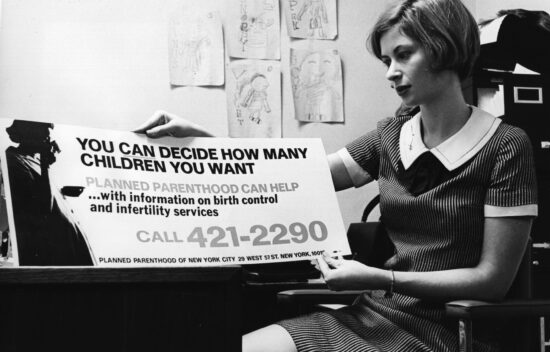
Griswold v. Connecticut (1965)
Introduction
In Griswold v. Connecticut, the Court held that the right of privacy within marriage predated the Constitution. The ruling asserted that the First, Third, Fourth, and Ninth Amendments also protect a right to privacy.
Resources
- Griswold v. Connecticut, The Oyez Project
Summary
The Executive Director of the Planned Parenthood League skimmed over the list of appointments. Many married couples came to Planned Parenthood for advice and assistance with birth control. Executive Director Griswold worked with a doctor and Yale Medical School professor to help these couples, even though they knew using birth control was against the law. The Connecticut statue read: “Any person who uses any drug, medicinal article or instrument for the purpose of preventing conception shall be fined not less than fifty dollars or imprisoned not less than sixty days nor more than one year or be both fined and imprisoned.” Griswold knew she herself could be fined and imprisoned, since the Connecticut law also held that “Any person who assists, abets, counsels, causes, hires or commands another to commit any offense may be prosecuted and punished as if he were the principal offender.” Griswold and her physician associate were fined $100 each. They appealed their case to the Supreme Court. The Court applied the due process clause of the Fourteenth Amendment to incorporate Bill of Rights protections to the states. In so doing, it found the Connecticut law unconstitutional because it violated the right to privacy within marriage – a right not listed in the Constitution but one on which several other rights, including expression and association, depend. The Court explained that the right to privacy was inherent in the First, Third, Fourth, Fifth, and Ninth Amendments. The Bill of Rights created “zones of privacy” into which the government could not intrude. “The First Amendment has a penumbra where privacy is protected from governmental intrusion…while it is not expressly included in the First Amendment its existence is necessary in making the express guarantees fully meaningful.” The Court continued, “The Third Amendment in its prohibition against the quartering of soldiers ‘in any house’ in time of peace without the consent of the owner is another facet of that privacy. The Fourth Amendment explicitly affirms the “right of the people to be secure in their persons, houses, papers, and effects, against unreasonable searches and seizures.” The Fifth Amendment in its Self-Incrimination Clause enables the citizen to create a zone of privacy which government may not force him to surrender to his detriment. The Ninth Amendment provides: ‘The enumeration in the Constitution, of certain rights, shall not be construed to deny or disparage others retained by the people.’” Finally, the Court concluded that privacy within marriage was a personal zone off limits to the government. “Would we allow the police to search the sacred precincts of marital bedrooms for telltale signs of the use of contraceptives? The very idea is repulsive to the notions of privacy surrounding the marriage relationship. We deal with a right of privacy older than the Bill of Rights…”
Questions
- Why were Griswold and her associate fined $100?
- Explain how the Court interpreted the First, Third, Fourth, Fifth, and Ninth Amendments in holding that the Constitution protects a right to privacy.
- The majority opinion asserted, “The association of people is not mentioned in the Constitution nor in the Bill of Rights. The right to educate a child in a school of the parents’ choice – whether public or private or parochial – is also not mentioned. Nor is the right to study any particular subject or any foreign language. Yet the First Amendment has been construed to include certain of those rights.” Is it possible for the Constitution to protect rights not specifically mentioned?
- The concurring opinion gave more weight to the Ninth Amendment in protecting the right to privacy in marriage. “To hold that a right so basic and fundamental and so deep-rooted in our society as the right of privacy in marriage may be infringed because that right is not guaranteed in so many words by the first eight amendments to the Constitution is to ignore the Ninth Amendment and to give it no effect whatsoever.” Do you believe the Ninth Amendment alone would have been grounds to overturn the Connecticut law banning birth control? Why or why not?
- In his dissent, Justice Black objected to the majority’s interpretation of the Bill of Rights. “One of the most effective ways of diluting or expanding a constitutionally guaranteed right is to substitute for the crucial word or words of a constitutional guarantee another word or words, more or less flexible and more or less restricted in meaning.” Do you agree that this is what the majority opinion did? Explain.